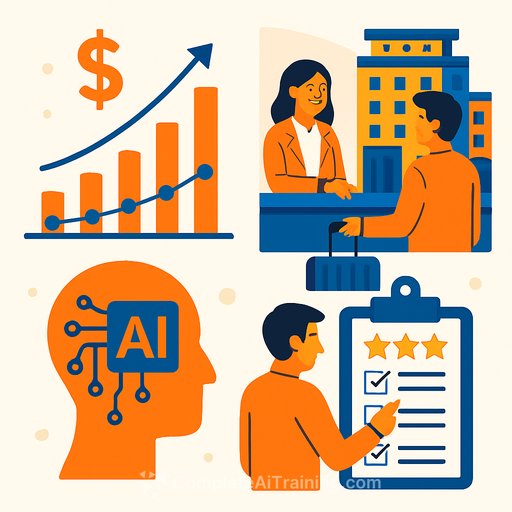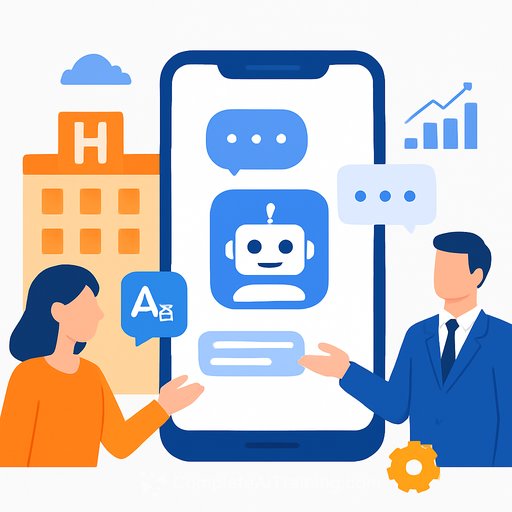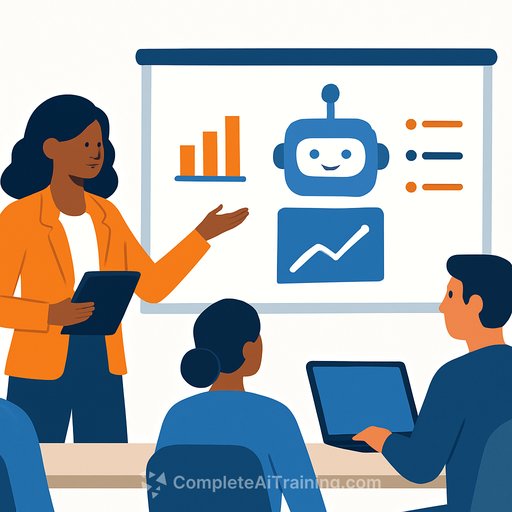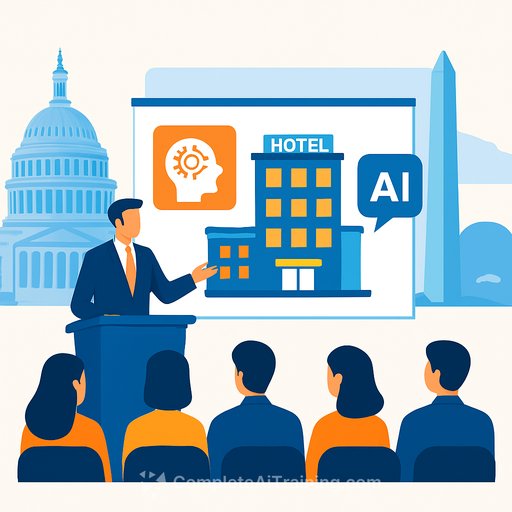The Complete Guide to Using AI in the Hospitality Industry in Cleveland in 2025
Too Long; Didn't Read:
Cleveland hotels should pilot 2–3 AI projects over 3–6 months—such as chatbots, personalization engines, predictive maintenance, and dynamic pricing—to boost revenue per available room (RevPAR) by up to 26% and guest satisfaction by up to 25%. These technologies also reduce labor and energy costs while providing measurable improvements in Net Promoter Score (NPS) and management efficiency.
AI solutions in 2025 offer practical tools that translate directly into higher revenue and streamlined operations. Chatbots and personalization engines improve guest experience, predictive maintenance cuts repair costs, and dynamic pricing maximizes revenue during peak demand. Starting with pilots lets hotels measure impact before scaling.
Training staff on AI basics, like prompt design and applied AI skills, helps accelerate adoption and ensures safer, more effective use. Begin with one department, track guest NPS and RevPAR, then expand systems that free staff for higher-value guest interactions.
AI Trends in Hospitality Technology for 2025
In 2025, AI in hospitality has moved beyond simple chatbots to integrated, revenue-focused systems. Hotels in Ohio combine predictive analytics for demand forecasting with IoT-powered room personalization and predictive maintenance. This approach reduces costs and capitalizes on event-driven demand spikes.
Examples include automated bulk check-ins without user interfaces, real-time AI rate adjustments, and concierge systems that learn guest preferences for targeted upselling. Predictive models tailored to local booking patterns help even mid-scale hotels reduce empty nights and energy use by automating HVAC and housekeeping.
Key AI Use Cases for Cleveland Hotels: Guest Experience and Personalization
AI-driven personalization improves guest satisfaction and ancillary revenue through digital concierges. These systems recommend, book, and upsell services using context-aware interactions via in-room tablets and messaging platforms. Human staff remain available for complex requests.
- Proactive itinerary suggestions for visitors
- Automated late-checkout and upsell flows linked to local events
- Guest-selected housekeeping opt-outs saving $15–$30 per room
Even a single daily upsell sold via the concierge can quickly cover hardware or subscription costs, making these systems a cost-effective investment.
Operations and Cost Savings: Predictive Maintenance, Housekeeping, and Procurement
Predictive maintenance uses IoT sensors and machine learning to detect issues like HVAC degradation before costly emergencies occur. AI-generated weekly operations reports highlight KPIs, staffing needs, and actionable items, freeing managers to focus on guest service.
Dynamic room-cleaning schedules reduce labor and chemical use. Pilots focusing on HVAC monitoring and AI reporting can quantify savings from fewer emergency repairs and less manager overtime before scaling.
Revenue Management: Dynamic Pricing and Event-Driven Demand in Cleveland
Dynamic pricing systems ingest booking pace, competitor rates, and local event data to adjust room rates in real time. This minimizes last-minute discounting and captures higher average daily rates (ADR) during demand spikes.
Hotels can start with weekends and convention-center periods, verify forecast accuracy, then expand to group bookings and ancillary offers. Case studies show AI-based revenue management systems (RMS) can boost total revenue by 20%–30%.
Safety, Security, and Data Privacy Considerations for Cleveland Properties
Safety and privacy must be core to any AI strategy. Local law enforcement uses AI-powered facial recognition, so hotels should avoid vendors that passively scrape photos for guest-facing features. Require vendor accuracy reports, bias testing, and implement strict consent and data retention policies for biometric data.
Workforce Impact: Will Hospitality Jobs Be Replaced by AI in Cleveland?
AI will automate repetitive tasks but is unlikely to replace hospitality jobs entirely. The industry faces staffing shortages, so AI is better viewed as a tool to shift staff towards higher-value roles.
Pair automation pilots with upskilling programs and local hiring partnerships to ensure displaced hours convert into improved guest experiences and new opportunities.
Practical Deployment Roadmap and ROI Model for Cleveland Hotels
Choose 2–3 high-impact AI pilots lasting 3–6 months each. Tie success to clear KPIs such as RevPAR growth, manager hours saved, and fewer emergency repairs. Measure outcomes before scaling and include basic MLOps and data governance to maintain control.
Vendors, Partnerships, and Local Ecosystem in Cleveland
Build vendor strategies around two pillars: a trusted regional managed service provider (MSP) for daily operations and a national AI platform partner for scale. This approach cuts onboarding friction and accelerates time to measurable savings and revenue gains.
Conclusion & Next Steps for Cleveland Hotels Adopting AI in 2025
Focus on a short list of measurable pilots that link directly to revenue and operational KPIs. Include data governance, privacy safeguards, and reliable 24/7 local support. This focused approach helps convert AI from a buzzword into practical business benefits.
Frequently Asked Questions
- Why should Cleveland hotels adopt AI in 2025?
AI delivers practical tools that improve revenue and operational efficiency. - What are the highest-impact AI use cases for Cleveland hotels?
Digital concierges, predictive maintenance, dynamic pricing, and AI-generated operations reporting. - How should Cleveland hotels pilot AI and measure ROI?
Start with 2–3 pilots, tie success to clear KPIs, and implement basic data governance. - What privacy and legal issues should be considered?
Prioritize privacy, avoid passive data collection, and require vendor bias and accuracy testing. - Will AI replace hospitality jobs in Cleveland?
AI will automate tasks but mainly reshape roles; pair automation with upskilling and local hiring.
For hospitality professionals interested in developing AI skills, training options are available to help staff adapt effectively. Explore relevant courses at Complete AI Training to prepare your team for these changes.
Your membership also unlocks:






